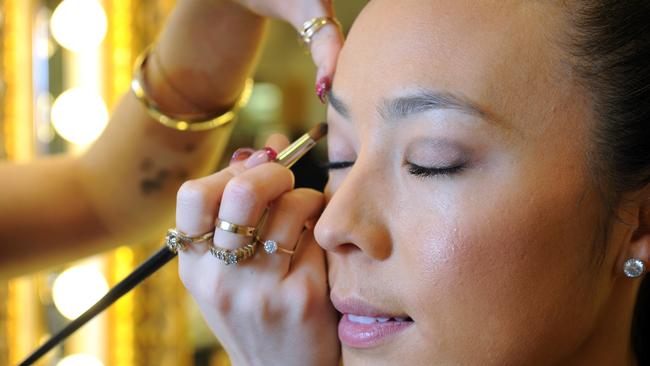Cosmetics brand Estee Lauder warns cost of living pressure to hurt sales
Cosmetics giant Estee Lauder has warned rising interest rates and cost of living pressures in Australia will put a damper on sales of luxury discretionary items such as make-up.

Cosmetics brand Estee Lauder has warned that it expects sales of make-up and other expensive discretionary products in Australia to come under sustained pressure as rising interest rates force many shoppers to “trade down” to cheaper goods and cut their spending.
The global cosmetics giant, based in New York, enters 2024 with strong tailwinds in its own make-up and cosmetics business in Australia, after reporting a 17.3 per cent sales leap for fiscal 2023 as shoppers returned to retailers, and in particular department stores, as the Covid-19 pandemic waned.
Estee Lauder’s sales momentum last year was also helped by the removal of a promotional scheme for its MAC cosmetics range, which added $4m to its coffers, or about 10 per cent of the sales lift for 2023.
But with the Reserve Bank recently ratcheting up interest rates in November to mark its 13th rate rise in the current round of monetary tightening, the $US44bn ($68bn) Estee Lauder global cosmetics juggernaut believes households will start to rein in spending on discretionary goods.
“Fiscal 2023 saw the impacts of rising interest rates and increased cost of living pressures on the Australian economy as a whole,” the make-up brands company said in its latest Australian accounts lodged with the corporate regulator.
“This is expected to continue to impact spending on discretionary premium items as economic pressures prompt consumers to trade down.”

The accounts for Estee Lauder show a healthy gain in sales and profits in Australia for 2023, despite the growing economic headwinds, with sales rising from $273.419m in 2022 to $320.69m as profits rose 22.5 per cent to $43.446m. Despite cost pressures and inflation, Estee Lauder managed to maintain its net operating profit percentage at 37.2 per cent.
Estee Lauder, one of the biggest make-up brand owners in the world, put down its improved performance over 2023, where profit growth outstripped revenue growth, to improved shopping conditions and the retreat on discounting.
“The group has achieved a higher performance as compared to fiscal 2022 with an increase to revenue of 17.3 per cent,” the company said. “$4m of the $47m increase is related to withdrawal of Back to MAC promotional scheme.
“The year-over-year increases were also driven by the return of consumers to bricks and mortar (department stores/freestanding stores) in the post-Covid-19 era. The specialty multi-retail channel and freestanding stores have led this recovery.”
The widening chasm between households with high disposable income to spend on discretionary items, such as cosmetics, and those struggling to meet mortgage repayments or skyrocketing rents, is playing out in the nation’s retail sector. Luxury and premium goods, from handbags to expensive wine, are selling well, while poorer households are cutting back wherever they can, shifting to cheaper foods like home brands and cooking more at home and going out less.
French luxury brand Hermes, known for its $12,000-plus Birkin bags, belts, handbags, jewellery and homewares, saw its revenue in Australia in calendar 2022 hit $388m, up from $297m, a gain of 30 per cent.







To join the conversation, please log in. Don't have an account? Register
Join the conversation, you are commenting as Logout